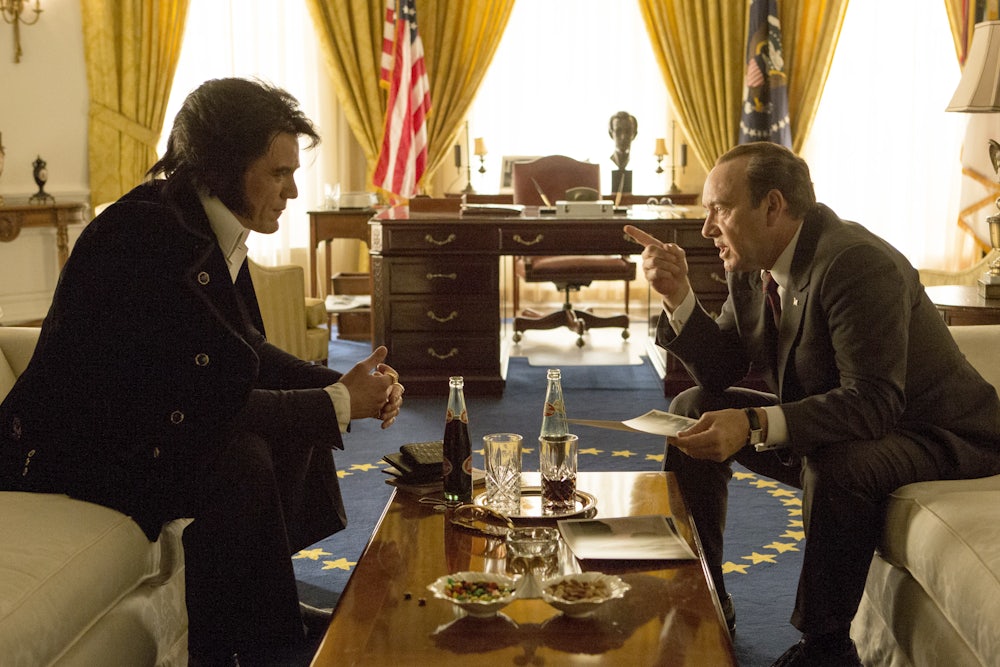Elvis & Nixon is a perfectly pleasant minor little comedy that flies by quickly and passes the time easily, and I can’t figure out if I should be disappointed by that fact, or relieved by it. The movie doesn’t have a lot to say about Elvis Presley, or about Richard Nixon, or even about the politics of the moment it captures—the Nixon presidency at the dawn of the new decade. It doesn’t delve deeply into either man, or into their interaction, which doesn’t actually happen until about 45 minutes into the film. (Still early enough to avoid the film having to be called Elvis v. Nixon.) It’s not an exploration of any deeper themes about the time, or the men, or their politics, or any of it. It is simply a straightforward light comedy, well-constructed, modest, and welcoming.
The movie features a lot more Elvis than Nixon. Elvis Presley as presented here is a lonely man, surrounded by yes-men, a little deranged but very much aware of his power and influence, if perhaps nothing else. He decides that the honorary badges he gets from various local law enforcement agencies are some sort of higher calling for him, and that he needs to be deputized to go undercover and ferret out the subversive elements of counterculture rock-and-roll. (The unstated presumption is that this sudden red-meat John Wayne-ism came less out of patriotism and more out of Elvis’s insecurity about his place in the new rock order.) So he requests a meeting with Nixon, who doesn’t care one whit—frustrating his beleaguered advisors (Colin Hanks and Evan Peters) trying to make the president look a little hipper—until his daughters find out and request a signed photo of the King. Thus, the eponymous meeting can occur.
There’s a dull, pointless subplot at the movie’s center about whether or not Jerry Schilling (Alex Pettyfer), a former Elvis aide who now works in Hollywood, will go back to working for Elvis or go meet his girlfriend’s parents for dinner back in California, a plot that’s takes up far too much of the movie and is ultimately dropped without much fuss. The key to the movie is how well we see these two men, these iconic figures captured in that one insane photo. Nixon is more of a cipher; he’s mostly just Generic President, played by Kevin Spacey as a slightly out of touch old man, who can’t quite grasp how deranged Elvis has become but briefly sees a kindred spirit—another guy, like him, who came from nothing to the top of his field, the original Started At The Bottom Now He’s Here. It’s mostly an impersonation by Spacey, which is an odd direction to take. Spacey has such a specific presence now—solidified by his role as a president, of all things—that you expect him to bring more to the part than he does. But he seems happy simply doing a Nixon impression and moving on. It’s sort of a bummer.
Fortunately, Michael Shannon as Elvis more than carries the weight. Shannon doesn’t look like Elvis at all—I’m not sure I know many humans who look less like Elvis—but Shannon just ignores that and burrows deep into Elvis, what it must have been like to have that much fame and influence and still feel so alone and unsatisfied. Shannon’s Elvis is a brooder, and one so isolated from the planet that he thinks going undercover in the counterculture music world in order to spy and provide information to Richard Nixon is an actual thing that could happen, but he’s also one who understands the power he has, and how to use it. There’s a sad vanity to Elvis as interpreted by Shannon, a sense that the role of Elvis that Elvis himself played was so weighty and all-encompassing that he couldn’t help but be lost by it. Yet Shannon is also charismatic enough to conjure up why people loved Elvis in the first place. It’s a terrific performance, and one you won’t be able to take your eyes off.
It’s probably more performance than this quiet little movie needs, but it’s appreciated nonetheless. The movie is almost polite—it takes its cues from a pleasant little performance from Hanks, who effortlessly conveys fundamental decency even when he’s playing a Nixon staffer—and purposefully conventional: It just wants to tell its little story and then get out of your way. There are many ways a movie like this could have been crazier, or kitschier; it could have devolved (or evolved, your pick) into camp, but that’s not director Liza Johnson’s style at all. She’s too low-key and wry for that; her Hateship, Loveship was uneven and a little too Sundance-quirky, but the tone was just right, like it is here. This is a movie that wants to please, and while it doesn’t do anything more than that, it does do that.
Grade: B-
Looking for more movie recommendations? Check out the latest episode of the Grierson & Leitch podcast.
Grierson & Leitch write about the movies regularly for the New Republic and host a podcast on film, Grierson & Leitch. Follow them on Twitter @griersonleitch or visit their site griersonleitch.com.
